As part of the Advance HE Small Development Projects 2019, Ulster University undertook a study to identify the extent to which teaching approaches contributed to improving the self-confidence and wellbeing of students. Dr Priyank Shukla, Principal Investigator of this study and Lecturer in Stratified Medicine (Bioinformatics) at Ulster University, Professor Stephen McClean, Professor of Biomedical Education at Ulster University, and Dr Elizabeth Hidson, Senior Lecturer in Education at the University of Sunderland, detail the project below.
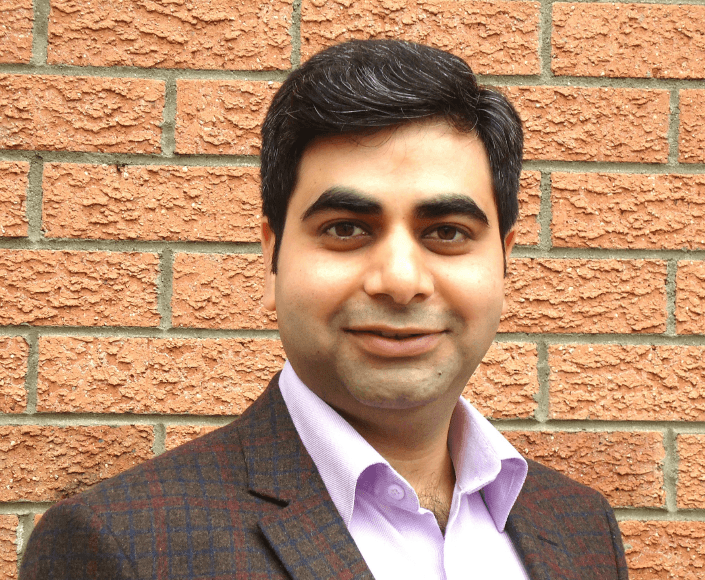
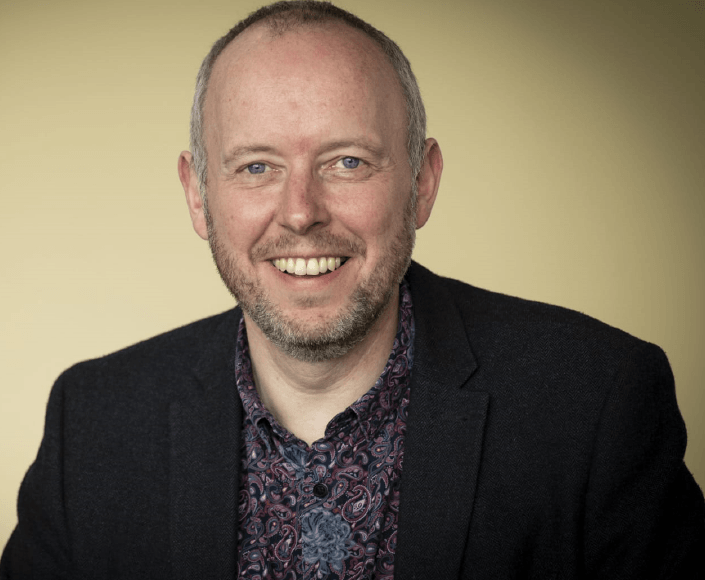
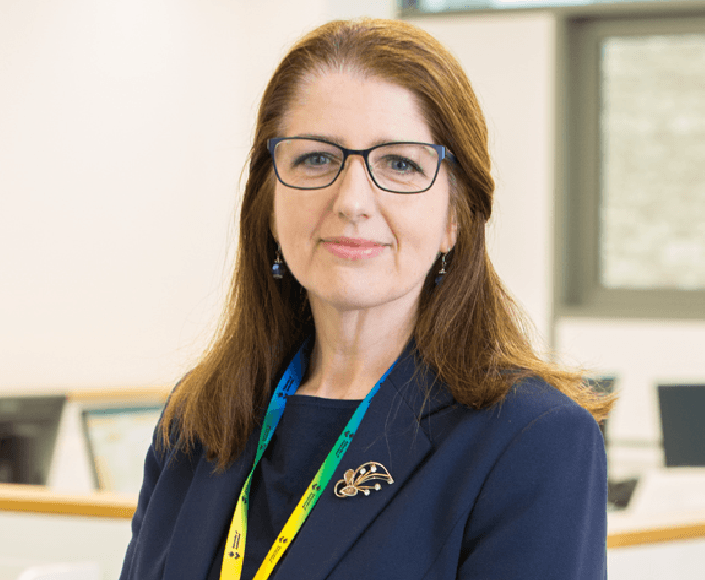
In pictures above, from left-to-right: Dr Priyank Shukla (Principal Investigator), Professor Stephen McClean, Dr Elizabeth Hidson.
Background
There is an increasing number of multi-disciplinary courses (such as Bioinformatics and Personalised Medicine) which involve cross-disciplinary subjects (such as Computer Programming) now available in the higher education sector. While they are technically informed by current job requirements, most course teams are faced with the challenge of teaching vastly diverse subjects. Considering that these multi-disciplinary courses are new, most of the time they lack appropriately tailored teaching methods, leading to a significant portion of this challenge (of learning those diverse subjects) being delegated directly to the students, causing stress and anxiety among them. This is contrary to traditional courses where one would study a single subject throughout the period of higher education and specialize in it in the end. This, in contrast, represents a comparatively relaxed learning track, and one where well tried-and-tested teaching methods exist.
The aim of the project was to identify the extent to which the proposed teaching approaches contributed to improving the self-confidence and wellbeing of students of a cross-disciplinary subject (Computer Science) in a multi-disciplinary course (BSc Hons in Stratified aka Personalised Medicine), with a view to sharing these with the wider academic community.
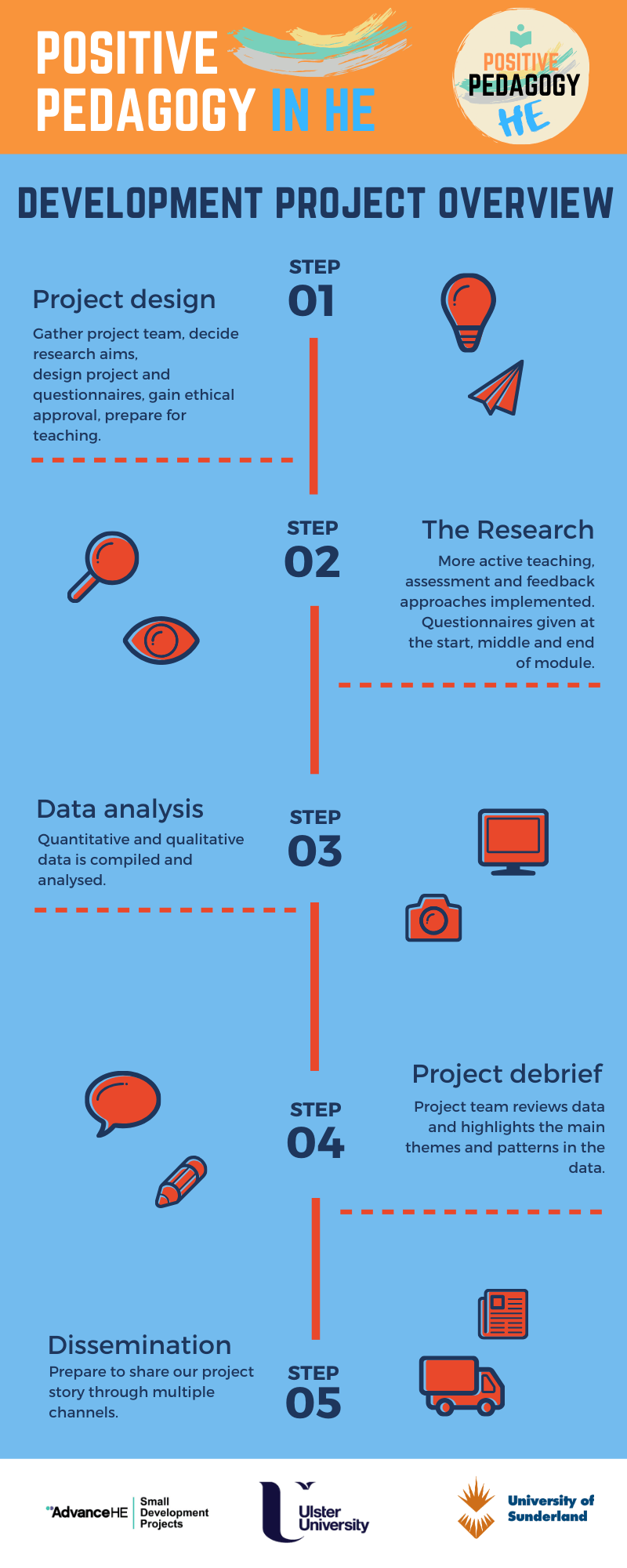
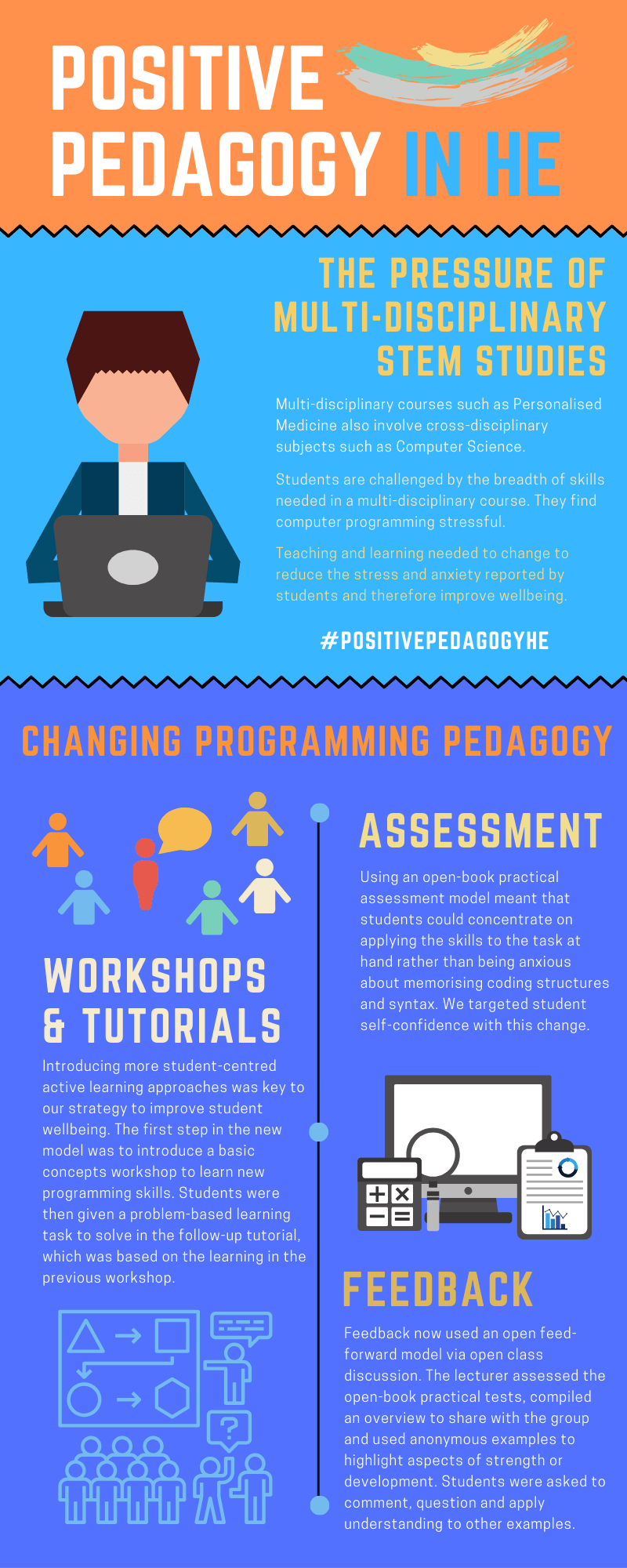
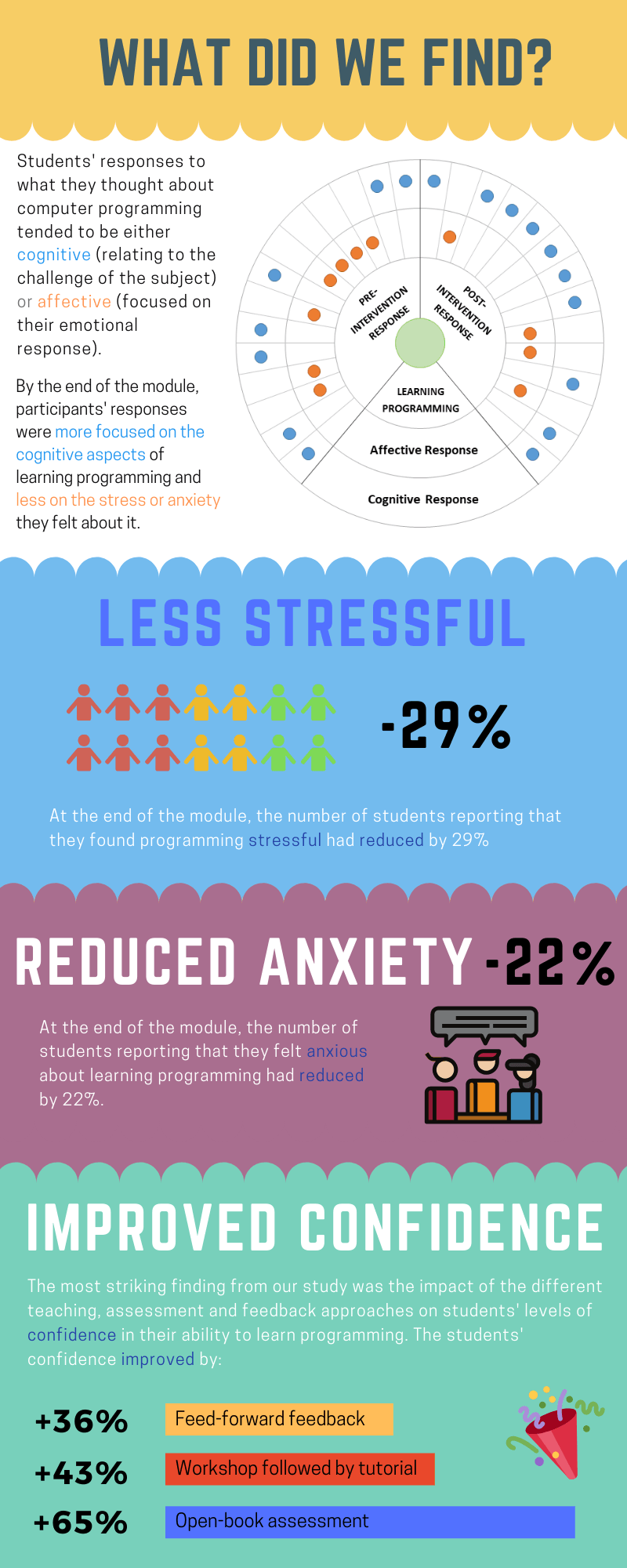
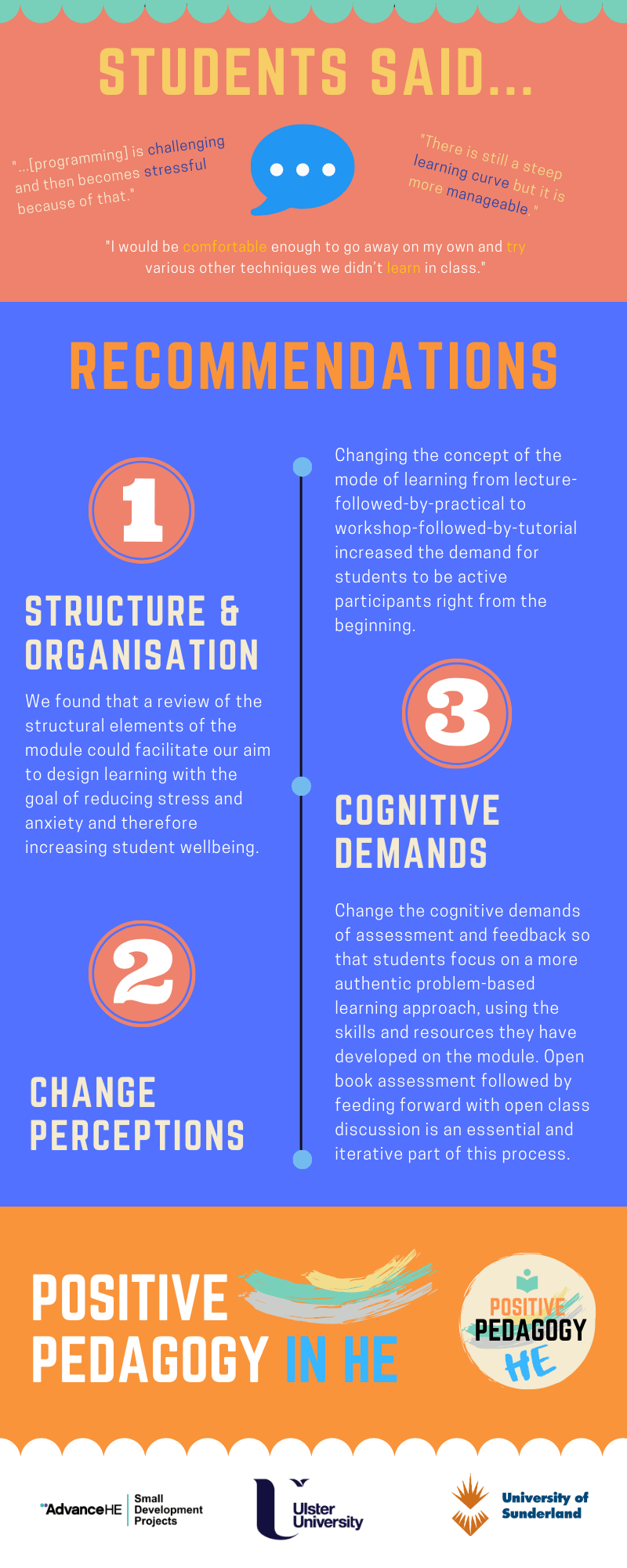
Infographic 1
Download
Infographic 2
Download
Infographic 3
Download
Infographic 4
Download
Approach
This project proposed trialling a suite of student-centred, active- and problem based- learning approaches, which we have operationalised as the “workshop-followed-by-tutorial” model for teaching, “open-book exams” for assessment and “open-feed-forward” model for feedback via open-class discussions.
We wanted to dedicate time to a piece of small-scale, systematic research that went beyond the level of a standard service evaluation or module feedback of the type that is prevalent in higher education. Student self-reports were gathered in order to identify the aspects of the approaches that contribute to reducing student anxiety when faced with a challenging cross-disciplinary subject.
Want to find out more?
Access past Small Development Projects in our archive
Findings
Results show that the number of students reporting that they found programming stressful reduced by 29% at the end of the module in comparison to the start of the module. Similarly, 22% of students reported a reduction in anxiety. In terms of confidence, each of the teaching, assessment and feedback approaches mentioned above showed an improvement in students’ confidence in their abilities to learn computer programming by 43%, 65% and 36%, respectively.
Results and feedback from this case study endorse that, for delivering a cross-disciplinary subject (in this case, Computer Programming) in a multi-disciplinary course (in this case, BSc Hons in Stratified aka Personalised Medicine), the approaches mentioned above are better for student wellbeing than the more traditional approaches of “lecture-followed-by-practical” for teaching, “closed-book” exams for assessment and “feed-back” model for feedback. They help in fostering a creative environment, encouraging independent thinking and team-work, as well as provide an enhanced learning experience to our students. This is important for developing economically important computing skills, which will prepare them for the Biomedical and/or Bio- Informatics job sectors.
Recommendations
We would recommend that these approaches be adopted more widely when teaching programming, with a view to improving the wellbeing of students learning programming.
Traditionally, the models for teaching programming came solely from higher education, as before the 2014 National Curriculum change in England (DfE, 2013), there was limited scope for teaching programming in schools. The students typically learning programming would be those keenest to do so as part of a Computer Science pathway. Our work on addressing the stress and anxiety that comes from learning an unfamiliar, cross-disciplinary subject (in this case Computer Programming) in a multi-disciplinary course (in this case, BSc Hons in Stratified aka Personalised Medicine), means that we will have a better understanding of how to teach programming. This positive pedagogy approach can transfer to Initial Teacher Education (ITE) for training Computer Science teachers, who will then in turn have to teach programming to school children from the ages of 11-18.
Given that the UK government is currently investing £84 million in training Computing teachers (DfE, 2018), many of whom lack sufficient programming skills, there is a real need for further research in this area.
Key learnings and challenges
Another learning made while executing this project is that multi-disciplinary course students from diverse academic backgrounds need time and more hands-on teaching approaches to assimilate a difficult cross-disciplinary subject. Providing students with sufficient time to develop their understanding and skills through the full hands-on workshops and tutorials so that they can work and learn at a comfortable pace helps them to learn more effectively.
Engagement, communication and impact
1. Through the training of teachers; those new to the profession as well as those currently employed. 70% of current Computing teachers lack an academic background in Computer Science (DfE, 2017). The University of Sunderland (the participating institution of this SDP) is the only HEI in the North East of England running a PGCE in Computer Science. It is also part of the National Centre for Computing Regional Delivery Programme, delivering the Computer Science Accelerator Programme to in-service teachers. We see this as a prime site for a research-informed approach to programming pedagogy beyond the Advance HE SDP.
2. The subsequent application of positive pedagogy in UK schools. This will initially be achieved through practitioner and academic dissemination channels, with the potential for University of Sunderland-trained teachers to trial the approach in their own teaching, ideally as part of a second tranche of research using this Positive Pedagogy model.
Within the lead institution (i.e. Ulster University), Learning and Teaching practices deployed in this project has impacted the recently successful revalidation exercise of BSc Hons in Stratified aka Personalised Medicine course. More specifically, the “workshop-followed-by-tutorial” model of teaching has influenced other computing modules of the course leading to the inclusion of workshop sessions in them.
Next steps and dissemination
The project team has published an opinion piece article in Higher Education Pedagogies journal. The article highlights the importance and the urgent need for positive pedagogy in multi-disciplinary STEM courses in higher education. The article is available at: www.tandfonline.com/doi/full/10.1080/23752696.2020.1847161
The Principal Investigator (Dr Shukla) gave an Oral Presentation followed by a Poster Presentation, entitled “Enhancing teaching practice in a cross-disciplinary subject using Positive Pedagogy approaches” at the Society for Research into Higher Education (SRHE)’s Newer and Early Career Researchers Conference in Newport, Wales, on 10th Dec 2019. The poster was awarded with the SRHE Delegates’ award for best conference poster 2019.
The Principal Investigator (Dr Shukla) gave an Oral Presentation, entitled “Improving computational skills of personalised medicine students through positive pedagogy” at Advance HE’s STEM conference in Manchester, on 30th Jan 2020.
The Principal Investigator (Dr Shukla) was invited as a guest speaker at a colloquium organized by National Institute of Educational Planning and Administration (NIEPA), New Delhi, India, on 13 January 2020, where he gave a lecture presenting the outcomes of this project.
The Principal Investigator (Dr Shukla) was invited to give an ISA Lecture at Institute of Advanced Studies, University of Bologna, Italy, on 6th July 2021, wherein he presented outcomes of this project. The online recording of this ISA Lecture is available at: www.youtube.com/watch?v=wa9HCUOOLg4
The project team is currently exploring various pedagogical journals in terms of their appropriateness of subject, range and scope, target audience and cost of publication, with an aim to submit a full-length research article on the project study.
The project team plans to roll out this study with future students’ cohorts at the lead institution (Ulster University) with the intention to accumulate longitudinal data.
Contact
For any further details of the project, please feel free to contact the Principal Investigator of this study Dr Priyank Shukla